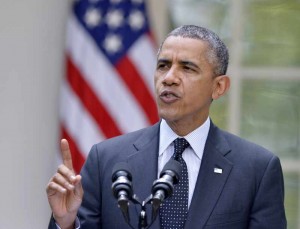The Obama administration, unable to move the needle in the three-year-old Syrian civil war, now finds itself on the verge of moving toward a “my enemy’s enemy” foreign policy with Iran in order to keep Iraq from falling apart next door reports .

The possibility of partnering with Iran to deal with a common foe — a radical Sunni militant group bent on regional domination — has immediately divided some of the Obama administration’s toughest critics.
Sen. John McCain, R-Ariz., called the idea of an alliance of convenience with Iran the “height of folly.”
Sen. Lindsey Graham, R-S.C., who typically is in lockstep with McCain on national security matters, on Sunday, though, likened it to the U.S. aligning with Stalin during World War II, because he “was not as bad as Hitler.”
“The Iranians can provide some assets to make sure Baghdad doesn’t fall,” Graham said.
Meanwhile, the U.S. is positioning Naval vessels in the Persian Gulf to assist in the event of an evacuation. Americans already are being moved out of the U.S. Embassy in Baghdad — according to a senior U.S. official, about 1,000 U.S. Embassy personnel are slated to be moved to other U.S. consulates in Iraq, as well as to Jordan. That represents one-fifth of the 5,000 personnel at the compound, the largest American embassy in the world. The embassy remains open reports Fox News.
The Obama administration still is weighing Iran’s overtures to assist the fellow Shiite-led government of Iraqi Prime Minister Nouri al-Maliki.
Secretary of State John Kerry said Monday that he’s not ruling out U.S.-Iran cooperation.
In an interview with Yahoo! News, Kerry said Washington is “open to discussions” with Tehran if the Iranians can help end the violence and take steps that would restore confidence in the Iraqi government. Asked about possible military cooperation with Iran, Kerry said he would “not rule out anything that would be constructive.” However, he stressed that any contacts with Iran would move “step-by-step.”
“We’re open to discussions if there is something constructive that can be contributed by Iran, if Iran is prepared to do something that is going to respect the integrity and sovereignty of Iraq and ability of the government to reform,” Kerry said.
His top spokesperson, though, took to Twitter shortly afterward to clarify his statements, and downplay the possibility of military cooperation.
Pentagon Press Secretary Rear Adm. John Kirby also pushed back on any suggestion the U.S. would coordinate militarily with Iran.
“We have no intention to coordinate military activities with Iran. No plans to have consultations with Iran about military activities in Iraq,” Kirby told reporters. “There is no joint military operation with Iran.”
The prospect of entering even a tacit alliance with Iran in order to stabilize Iraq raises challenging diplomatic and security questions for the Obama administration, which has struggled to define where America fits into a rapidly changing Middle East.